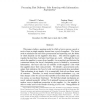Free Online Productivity Tools
i2Speak
i2Symbol
i2OCR
iTex2Img
iWeb2Print
iWeb2Shot
i2Type
iPdf2Split
iPdf2Merge
i2Bopomofo
i2Arabic
i2Style
i2Image
i2PDF
iLatex2Rtf
Sci2ools
110
click to vote
MANSCI
2006
2006
Procuring Fast Delivery: Sole Sourcing with Information Asymmetry
This paper studies a queuing model in which a buyer sources a good or service from an single supplier chosen from a pool of suppliers. The buyer seeks to minimize the sum of her procurement and operating cost, the latter of which depends on the supplier's lead time. The selected supplier can regulate his lead time, but faster lead times are costly. Although the buyer selects the supplier to source from (possibly via an auction) and dictates the contractual terms, the buyer's bargaining power is limited by asymmetric information: the buyer only has an estimate of the suppliers' costs while the suppliers know their costs precisely. We identify a procurement mechanism that minimizes the buyer's total cost (procurement plus operating). This mechanism is not simple: it is a numerically derived non-linear menu of contracts. Therefore, we study several simpler mechanisms: e.g., one that charges a late fee and one that specifies a fixed lead time requirement (no menus, no ...
Buyer | Lead Time | MANSCI 2006 | Procurement |
| Added | 14 Dec 2010 |
| Updated | 14 Dec 2010 |
| Type | Journal |
| Year | 2006 |
| Where | MANSCI |
| Authors | Gérard P. Cachon, Fuqiang Zhang |
Comments (0)

